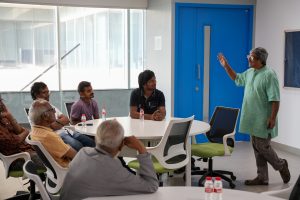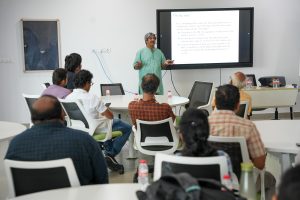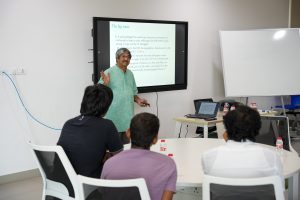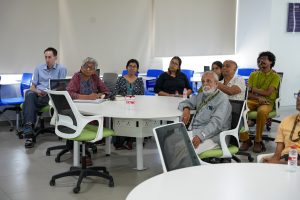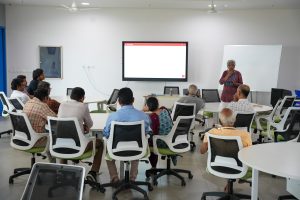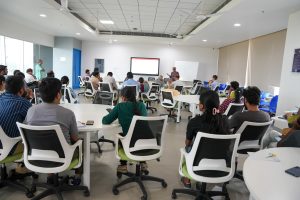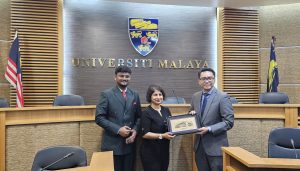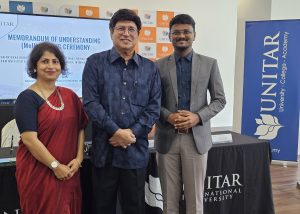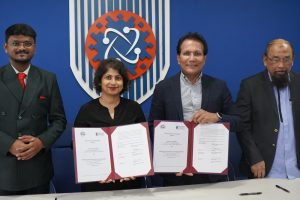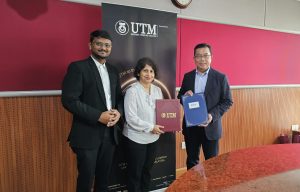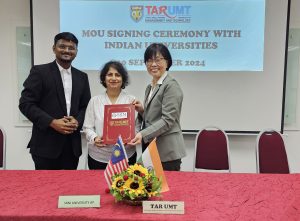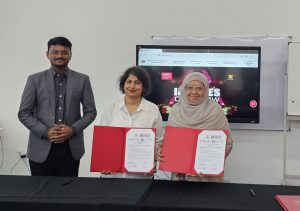- Prof. R Ramanujam Exploring the Role of Mathematics and Science in Social Inclusion October 22, 2024
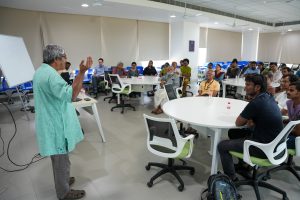 On October 4, 2024, Department of Mathematics at SRM University-AP hosted its 10th Distinguished Lecture, featuring renowned mathematician and educator Prof. R Ramanujam. The event attracted a diverse audience, including BSc and BTech students, PhD candidates, and faculty members, all eager to engage with the critical topic of mathematics and science education for students from socially and economically marginalised backgrounds.
On October 4, 2024, Department of Mathematics at SRM University-AP hosted its 10th Distinguished Lecture, featuring renowned mathematician and educator Prof. R Ramanujam. The event attracted a diverse audience, including BSc and BTech students, PhD candidates, and faculty members, all eager to engage with the critical topic of mathematics and science education for students from socially and economically marginalised backgrounds.Prof. Ramanujam’s lecture posed a thought-provoking question: “What do mathematics and science education mean to a student from socially and economically marginalised sections?” Drawing from his extensive experience in various educational contexts, he provided valuable insights into the intersection of education and social equity. His work with the Tamil Nadu Science Forum, government curriculum bodies, and teacher education programs at Azim Premji University in Bengaluru informed his perspective on the necessity of aligning educational practices with the realities faced by marginalised communities.
During his talk, Prof. Ramanujam emphasised the importance of conducting educational research that is deeply rooted in social contexts. He argued that curriculum-making decisions should be informed by such research to ensure that education is socially inclusive and responsive to the unique challenges faced by disadvantaged students. His advocacy for an education system that addresses the needs of all learners resonated strongly with the audience, highlighting the potential for education to serve as a transformative force in society.
Prof. R Ramanujam is a distinguished figure in the fields of mathematics and education. He completed his PhD at the Tata Institute of Fundamental Research (TIFR) and pursued postdoctoral work at the City University of New York (CUNY), USA. His long-standing association with the Institute of Mathematical Sciences (IMSc) in Chennai and his current role as a visiting professor at Azim Premji University further underscore his commitment to advancing educational practices.
The lecture provided a stimulating exploration of how mathematics and science education can help address social inequalities. Prof. Ramanujam’s reflections on education, grounded in his experiences with marginalised communities, left a lasting impact on attendees. The event concluded with an engaging Q&A session, where participants raised questions about the challenges of implementing socially rooted educational reforms. This discussion reinforced the lecture’s key themes of inclusivity and the transformative potential of education when designed to meet the diverse needs of learners.
The 10th Distinguished Lecture at SRM University-AP not only highlighted the importance of educational equity but also inspired dialogue on how institutions can better serve all students, particularly those from marginalized backgrounds.
Continue reading → - Dr Mohammad Abdussami October 18, 2024
- Pioneering IoT Security: Dr Mohammad Published in Prestigious Q1 Journal October 17, 2024
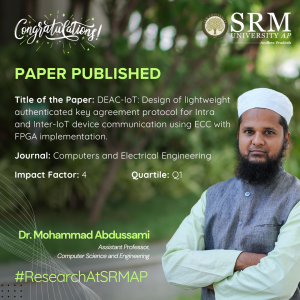 Dr Mohammad Abdussami, an Assistant Professor in the Department of Computer Science and Engineering, has made a significant contribution to the field of Internet of Things (IoT) security with the publication of his paper titled “APDEAC-IoT: Design of Lightweight Authenticated Key Agreement Protocol for Intra and Inter-IoT Device Communication Using ECC with FPGA Implementation.” This groundbreaking research has been published in the esteemed Q1 journal Computers and Electrical Engineering, which boasts an impact factor of 4.
Dr Mohammad Abdussami, an Assistant Professor in the Department of Computer Science and Engineering, has made a significant contribution to the field of Internet of Things (IoT) security with the publication of his paper titled “APDEAC-IoT: Design of Lightweight Authenticated Key Agreement Protocol for Intra and Inter-IoT Device Communication Using ECC with FPGA Implementation.” This groundbreaking research has been published in the esteemed Q1 journal Computers and Electrical Engineering, which boasts an impact factor of 4.Dr Abdussami’s research addresses critical security challenges faced by IoT devices, particularly in facilitating secure communication between intra and inter-device networks. The lightweight authenticated key agreement protocol he has developed utilizes Elliptic Curve Cryptography (ECC) and Field-Programmable Gate Array (FPGA) implementation to enhance the security framework of IoT ecosystems.
As the adoption of IoT devices continues to expand across various sectors, the importance of robust security protocols cannot be overstated. Dr Abdussami’s work is poised to make a substantial impact on how devices communicate safely and efficiently, ensuring the integrity and confidentiality of data transmitted over the network.
As the demand for secure IoT solutions continues to grow, Dr Abdussami’s research stands as a beacon for future developments in this crucial area, potentially paving the way for safer and more efficient IoT interactions globally.
Abstract:
In this research work, we proposed a fog-enabled network architecture integrated with IoT devices (Intra and Inter-domain IoT devices) and developed the DEAC-IoT scheme using Elliptic Curve Cryptography (ECC) for secure authentication and key agreement. Our protocol is designed to protect device-to-device communication from security threats in resource-constrained IoT environments.
Citation format:
Abdussami Mohammad, Sanjeev Kumar Dwivedi, Taher Al-Shehari, P. Saravanan, Mohammed Kadrie, Taha Alfakih, Hussain Alsalman, and Ruhul Amin. “DEAC-IoT: Design of lightweight authenticated key agreement protocol for Intra and Inter-IoT device communication using ECC with FPGA implementation.” Computers and Electrical Engineering 120 (2024): 109696.
Explanation of the Research in Layperson’s Terms:
With more and more devices connecting wirelessly through the Internet of Things (IoT) (think of smart home gadgets, wearables, etc.), keeping their communications secure has become a big priority. However, many current communication methods for IoT devices don’t provide strong enough security. This leaves them open to cyber-attacks.
The challenge is to create a security system that is safe from attacks and doesn’t require too many computations. This is important because IoT devices often have limited resources (like low battery power or slower processors).
In this research, the authors have devised a solution: a new type of network setup (called fog-enabled architecture) that connects IoT devices with each other and with external devices. They’ve also developed a security protocol called DEAC-IoT, which uses Elliptic Curve Cryptography (ECC)—a highly efficient method for securing communications.
Their system makes it easier for IoT devices to authenticate (verify each other’s identity) and securely exchange keys (used to encrypt data), all while being lightweight enough to run on devices that don’t have a lot of processing power or energy.
In short: the paper offers a way to securely connect IoT devices with minimal computations, making communication between devices safe from hackers, even in environments where cyber threats are common.
Practical Implication and Social Implications Associated:
The practical implementation of this research can strengthen the security of IoT devices across many sectors, from homes and cities to healthcare and industries. The proposed DEAC-IoT scheme can also be used to implement vehicle to vehicle secure communication in autonomous vehicles, VANETs and Internet of Vehicles scenario.
Socially, it can enhance trust in IoT technology, protect privacy, safeguard critical infrastructure, and promote economic and technological development—while ensuring security remains affordable even in resource-constrained environments.
In Industrial IoT (IIoT) Scenario: In industries where machines are connected via IoT (such as in factories), devices need to communicate securely to ensure the smooth running of production lines. The DEAC-IoT protocol could secure these communications, preventing industrial espionage or sabotage.
Future Research Plans
1. Design of group key authentication protocols for IoT devices communication.
2. Design of handover authentication protocols for Fog-enabled IoT devices communication.
3. Design of quantum safe authentication protocols for vehicle-to-vehicle communicationCollaborations:
1. Dr Sanjeev Kumar Dwivedi, Centre of Artificial Intelligence, Madhav Institute of Technology and Science (MITS), Gwalior, Madhya Pradesh 474005, India.
Continue reading →
2. Dr Taher Al-Shehari, Computer Skills, Department of Self-Development Skill, Common First Year Deanship, King Saud University, 11362, Riyadh, Saudi Arabia.
3. Dr Mohammed Kadrie, Computer Skills, Department of Self-Development Skill, Common First Year Deanship, King Saud University, 11362, Riyadh, Saudi Arabia
4. Dr P Saravanan, Department of Electronics and Communication Engineering, PSG College of Technology, Coimbatore, India.
5. Dr Ruhul Amin, Department of Computer Science & Engineering, IIIT Naya Raipur, Naya Raipur 493661, Chhattisgarh, India
6. Dr Taha Alfakih, Department of Information Systems, College of Computer and Information Sciences, King Saud University, Riyadh 11543, Saudi Arabia
7. Dr Hussain Alsalman, Department of Computer Science, College of Computer and Information Sciences, King Saud University, Riyadh 11543, Saudi Arabia - SRM AP Partners with Amaravati Drone Summit 2024 October 16, 2024
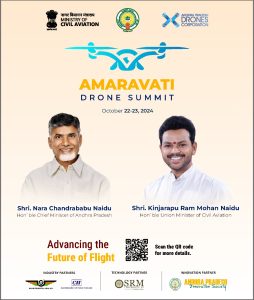 The Government of Andhra Pradesh has announced its partnership with SRM University-AP as its technology partner for the Amaravati Drone Summit 2024. The Summit will feature Union Minister of Civil Aviation, Shri. Kinjarapu Ram Mohan Naidu and the Chief Minister of Andhra Pradesh, Shri. Chandra Babu Naidu. Their presence will underscore the importance of the Summit and signal the government’s commitment to embracing new technologies that have the potential to revolutionise various sectors.
The Government of Andhra Pradesh has announced its partnership with SRM University-AP as its technology partner for the Amaravati Drone Summit 2024. The Summit will feature Union Minister of Civil Aviation, Shri. Kinjarapu Ram Mohan Naidu and the Chief Minister of Andhra Pradesh, Shri. Chandra Babu Naidu. Their presence will underscore the importance of the Summit and signal the government’s commitment to embracing new technologies that have the potential to revolutionise various sectors.The summit will feature thought-provoking sessions by Vice Chancellor Prof. Manoj K Arora, along with other industry and academic leaders. Additionally, a dedicated exhibition aimed at showcasing solutions and addressing challenges encountered in technology operations will be featured. The Summit will also host Hackathons for students, providing them with a platform to demonstrate their skills and technological expertise. The university’s Centre for Drone Technology will take active part in mutliple sessions at the summit.
By nominating SRM University-AP as its technological partner, the Government of Andhra Pradesh is leveraging the university’s state-of-the-art research facilities and its pool of talented Faculty, researchers and students. This partnership is expected to not only provide a platform for showcasing cutting-edge drone technology but also to spur research and development in this rapidly evolving field.
The event is poised to become a landmark occasion, paving the way for new collaborations and innovations that could redefine the boundaries in the world of technology.
Continue reading → - SRM AP Expands Horizons with India-Malaysia Academic Expedition October 16, 2024
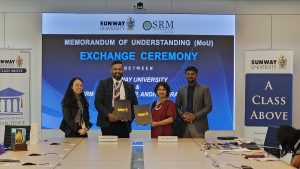 The Directorate of International Relations and Higher Studies (IR & HS), led by Dr Sudeshna Saha, Assistant Director and Sandeep Samala, Deputy Manager, embarked on a fruitful academic expedition tour to Kuala Lumpur from September 30 to October 3, 2024. This initiative aimed to foster collaboration between SRM University-AP and several prestigious Malaysian institutions.
The Directorate of International Relations and Higher Studies (IR & HS), led by Dr Sudeshna Saha, Assistant Director and Sandeep Samala, Deputy Manager, embarked on a fruitful academic expedition tour to Kuala Lumpur from September 30 to October 3, 2024. This initiative aimed to foster collaboration between SRM University-AP and several prestigious Malaysian institutions.The primary objectives of the expedition were to explore collaborative opportunities, identify potential research partnerships, and promote matching grants that would mutually benefit the participating institutions.
During the expedition, a significant milestone was achieved with the signing of Memorandums of Understanding (MoUs) with several prominent Malaysian universities. Among them were the University of Malaya (#60 in QS World University Rankings 2025), Universiti Teknologi Malaysia (#181), Sunway University (#539), and Universiti Tunku Abdul Rahman (#800-#850). Additionally, collaborations were established with Malaysia University of Science and Technology (#88 in Asian University Rankings-Southeastern Asia 2024), Tunku Abdul Rahman University of Management and Technology (#139), University Malaysia of Computer Science & Engineering, and UNITAR International University.The primary objectives of the visit were multi-faceted:
1. Exploring Collaborative Opportunities: The expedition aimed to identify and establish potential research collaborations between SRM University-AP and Malaysian institutions, fostering an environment conducive to joint academic exploration.
2. Promoting Matching Grants: The delegation sought to encourage initiatives such as matching grants that mutually benefit both institutions, enhancing research capabilities and funding opportunities.
3. Co-hosting Conferences: Plans were established to organise joint conferences, seminars, or workshops that facilitate the sharing of research findings and help build a robust academic network.
4. Collaborating on Scientific Projects: The institutions discussed initiating and supporting collaborative scientific research projects reflecting their combined strengths.
5. Focused Research Areas: Identifying key research areas for collaboration was paramount, with a commitment to connect with relevant Points of Contact (PIC) at the University of Malaya.
6. Joint Publications: The MoUs aim to foster partnerships for co-authored publications, thereby benefiting both institutions’ academic output.
7. Postgraduate Supervision: The institutions are committed to enhancing academic development by collaborating in the joint supervision of postgraduate students, emphasising PhD candidates.
8. Staff Mobility & Research Initiatives: A significant focus was placed on facilitating academic staff exchange programs to promote staff mobility and collaborative research initiatives.
9. Undergraduate Mobility Programs: Developing student mobility programs, including summer schools or student exchange opportunities, for undergraduates was a key part of the discussions.
The expedition successfully laid the groundwork for future collaborations, focusing on immersion programs, research internships, student and faculty mobility, and joint research initiatives.
As SRM University-AP continues to establish itself as a leader in higher education, this journey to Malaysia represents a commitment to nurturing global academic relationships and empowering the next generation of learners through collaborative endeavors.
Continue reading →


